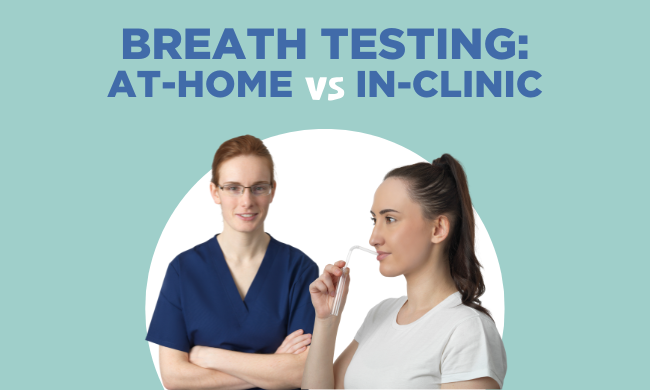Why do we need breath tests?
Digestive disorders can be challenging to diagnose as symptoms often overlap. For example, bloating, diarrhea, and abdominal pain can be indicative of many conditions, including small intestinal bacterial overgrowth (SIBO) or carbohydrate malabsorption (CM) conditions. However, SIBO often requires medical treatment (e.g., antibiotics) whilst CM is managed with dietary changes, so diagnosing the right disorder is crucial to ensure that the appropriate treatment pathway can begin without delay.
Both SIBO and CM are related to bacterial activity in the gut which produces hydrogen and methane gases. These gases are then exhaled and can be detected using breath tests.
What does a breath test involve?
Breath tests can either be carried out in healthcare facilities or at home, but before we look at the differences between testing locations, let’s explore what a gut health breath test involves.
Normally, you should not have taken any antibiotics for around four weeks before your test. This ensures that the bacteria that might be causing your digestive symptoms are present and able to produce the gases that the test measures. Before your breath test, you may be asked to restrict your intake of certain foods and medications, and you will usually be asked to fast for around 12 hours overnight before you take the test.
To measure the gases produced by gut bacteria, we first need to give them something to ferment, usually referred to as a ‘substrate’. Substrates are simple carbohydrates that gut bacteria can break down easily, producing methane and hydrogen gases in the process. The substrate used in breath testing differs based on the disorder under investigation – for SIBO, lactulose and glucose are common substrates, whilst fructose and lactose are more often used for carbohydrate malabsorption tests (1).
The substrate is usually dissolved in a glass of water and breath measurements are then taken at specific intervals over the course of two to four hours. You may also record digestive symptoms throughout the breath test to help your clinician to interpret your results.

Breath testing in the clinic
Breath tests for digestive health problems including SIBO and CM can be performed in a clinic or healthcare facility using point-of-care devices which give instant results readouts. Tests will normally be carried out by a nurse, medical assistant, or other qualified health care professional. The process of completing the breath test is the same as described above, but there may be some additional time before the breath test to discuss your symptoms or medical history with the supporting health care practitioner.
Although in-clinic breath testing has the benefit of in-person health care practitioner support, there are some disadvantages, mostly affecting you, the patient:
- To attend a clinic or healthcare facility, you will need to take time away from work, life, or school – the breath testing can take up to four hours, a substantial time commitment.
- Traveling to and from the clinic adds extra disruption to your day, as well as the additional cost of public or private transport (including parking).
- Breath testing equipment used in clinics needs to be disinfected between patient visits – these safety measures, coupled with potential space limitations and evolving safety guidelines, can lead to longer wait times for both diagnosis and treatment.
At-home breath testing
Breath testing can also be carried out at home, allowing you to collect samples in the comfort of your own home at a time that works for you. Test preparation and sample collection procedures follow a similar structure as in-clinic: dietary restriction, substrate consumption, followed by breath sample collection over several hours. Once you’ve finished collecting samples, you can send them back to the provider’s laboratory for analysis, normally in a pre-paid package. Your results can then be interpreted by your clinician or an approved medical practitioner in partnership with the provider.
At-home testing is convenient and avoids most of the disadvantages of in-clinic testing. You won’t have to take time off work to travel anywhere or worry about wait times for diagnosis and treatment.
Are at home SIBO breath tests accurate?
The short answer is yes! As long as you follow the at home SIBO breath test preparation and the instructions for the test, then your result will be as accurate as an in-clinic test. If you would like to delve into the science behind this, then this research poster explains it all.
With OMED Health, you can have the best of both worlds
You can also now purchase your OMED Health Breath Analyzer device which will offer convenient at-home breath hydrogen and methane tracking and diagnosis. As well as this, you can use the App to log your symptoms, the foods you eat and any potential triggers. Our expert gut physiologists will be able to review your data to help build a personalized treatment and management plan, helping you to take control of your digestive health.
References
- Rana SV, Malik A. Hydrogen breath tests in gastrointestinal diseases. Indian Journal of Clinical Biochemistry. 2014. 29(4):398-405. DOI: 1007/s12291-014-0426-4.




